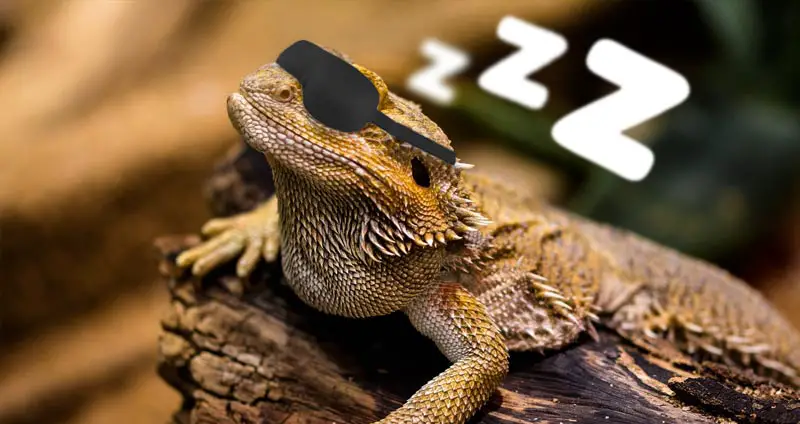Has your bearded dragon suddenly gotten extremely lethargic or stopped moving altogether? Have you tried poking and prodding them and gotten no response back? Don’t worry! There’s a very good chance that your bearded dragon isn’t dead, they’re just going through something called brumation.
As a bearded dragon owner, you should be aware of the many different characteristics of this interesting lizard. That’s why we’re going to give you this overview of bearded dragon brumation, what causes it, what to look for, and how to deal with it.
Table of Contents
What Is Brumation?
Brumation is the reptile version of hibernation, where the reptile becomes dormant for a period of time to conserve energy in reaction to environmental changes. During this period, a bearded dragon may not eat, drink, use the bathroom, or move for quite a while. To do this, they may find the coldest and darkest part of their enclosure and appear to “shut down”.
This is a natural occurrence in reptiles and amphibians and shouldn’t cause any worry. It can happen throughout the year, and both male and female bearded dragons experience it, with females tending to brumate for a bit longer.
Difference Between Brumation & Hibernation
As stated, brumation is the reptile version of hibernation. However, this doesn’t mean that they’re exactly the same thing. With such different body and behavioral types, reptile brumation actually differs a decent amount from mammal hibernation. The main difference between these two is that brumation isn’t a true long-term sleep.
During brumation, bearded dragons will wake up several times, sometimes for days at a time! While this characteristic may cause confusion and panic among owners, there’s quite a use for it. Mammals store all that they need to store for hibernation, so they can sleep right until they come out of hibernation. Reptiles, on the other hand, actually need to wake up to drink and maybe get some sun to warm their bodies before going back to their dormant state.
During this period where they’re awake, reptiles will be very lethargic, but they’re awake nonetheless. With this key difference, you could call brumation ‘casual’ hibernation.
Which Reptiles Brumate?
Although we’re focusing on bearded dragon brumation, it helps to know which other reptiles brumate! While bearded dragons are the most common reptile pet that brumate, there are some others that do it as well. Some turtles, tortoises, snakes, and even some frogs experience brumation!
While all of these animals are quite different, they experience brumation in virtually the exact same way.
Why Do Bearded Dragons Brumate?
Brumation may seem like a big deal to someone just learning about it, but in reality it’s actually quite pointless for captive bearded dragons! If it’s pointless, then why do they still do it? Well, it essentially comes down to their programming and what they’ve been used to doing for thousands of years in the wild.
In the wild, bearded dragons are exposed to a wide array of different temperatures and environmental changes and must adapt accordingly. Therefore, when the temperature gets cooler, light patterns change, and the food supply drops quickly, their bodies would shut down in order to get through this difficult time.
In captivity, your bearded dragon should be exposed to a consistent temperature, light pattern, and food supply, so there’s no need for brumation. However, because it’s an innate behavior, many bearded dragons’ bodies take over and continue to shut down for periods of time.
Because of the fact that brumation in captive bearded dragons is instinctual and not driven by environmental factors, some bearded dragons will experience it and some won’t. All bearded dragons are different, so it’s important that you know what to look for to know if your bearded dragon is preparing for brumation or simply getting ill.
Bearded Dragon Brumation Symptoms
There are a few key symptoms that will help tell you that your bearded dragon is about to experience brumation.
- Displaying lethargy, laziness, and overall less activity
- Going to sleep at earlier times or sleeping later into the day
- Eating a lot less or not at all
- No bowel movements
- Attempting to hide in dark, cool areas of the habitat
While these are all symptoms of bearded dragon brumation, they’re not exclusive to it. Take your bearded dragon to a vet if you suspect that it’s sick.
How To Handle Bearded Dragon Brumation
When your bearded dragon first starts to show symptoms of brumation, it’s important that you first ensure that they’re not sick. Are their environmental conditions still optimal? Do they have parasites or some other ailment? Would they be stressed for any reason?
If you notice that your bearded dragon hasn’t pooped for a while but you don’t think that they’re entering brumation, you can quickly make sure everything is okay. Soaking your bearded dragon in warm water and gentle rubbing their stomach is a great way to get things moving inside of them. This soaking is beneficial for brumation preparation, too, as it works to hydrate their skin before their long period of dormancy.
Once your bearded dragon poops, you can get it tested for parasites. If everything comes up clean, there is a good chance that brumation is causing your bearded dragon to act strange.
During Brumation
During your bearded dragon’s brumation, it’s important that you keep their tank essentially the same as it’s kept when they’re awake. This entails keeping the heat and lights on for them on one side of the tank. You need to do this because they need a place to bask while they’re temporarily awake.
Traveling further down the same line of thought, you’ll also want to keep a clean supply of water ready and available. Remember, bearded dragons still need to drink during brumation, so they need to have access to water for those random times.
While brumating, bearded dragons bury themselves under the ground to conserve heat, drawing moisture from the wet ground to stay hydrated. In captivity, there won’t be as much moisture to draw out of the ground, making it necessary to rehydrate your bearded dragon occasionally. If you notice that your bearded dragon is dehydrated (the skin on their back doesn’t ‘bounce back’ when pinched), soaking them in a tub for 10-15 minutes usually does the trick. Be sure to keep their head above the water!
One more thing to note is that you should watch for weight loss. Bearded dragons only lose a couple of grams during brumation, so excessive weight loss could indicate the presence of a serious problem that needs to be addressed.
How To Prevent Brumation
The best chance you’ll have of helping your bearded dragon avoid brumation is, ironically, keeping things as normal as possible. As the fall and winter months approach, make sure to keep the temperature, humidity, and lighting in your bearded dragon’s enclosure consistent. If your bearded dragon doesn’t notice a changing in the environment around it, it may be able to overcome its natural instinct to brumate.
However, this isn’t guaranteed. As stated previously, all bearded dragons are different, meaning that yours may simply brumate no matter what. In this case, just let them do their thing. Rehydrate them occasionally, but let them rest. Brumation is a natural process that’s relatively risk-free, so it’s best that you just let it happen.
The only downside to brumation is that you’ll have to go without your bearded dragon’s company for a short period of time!

